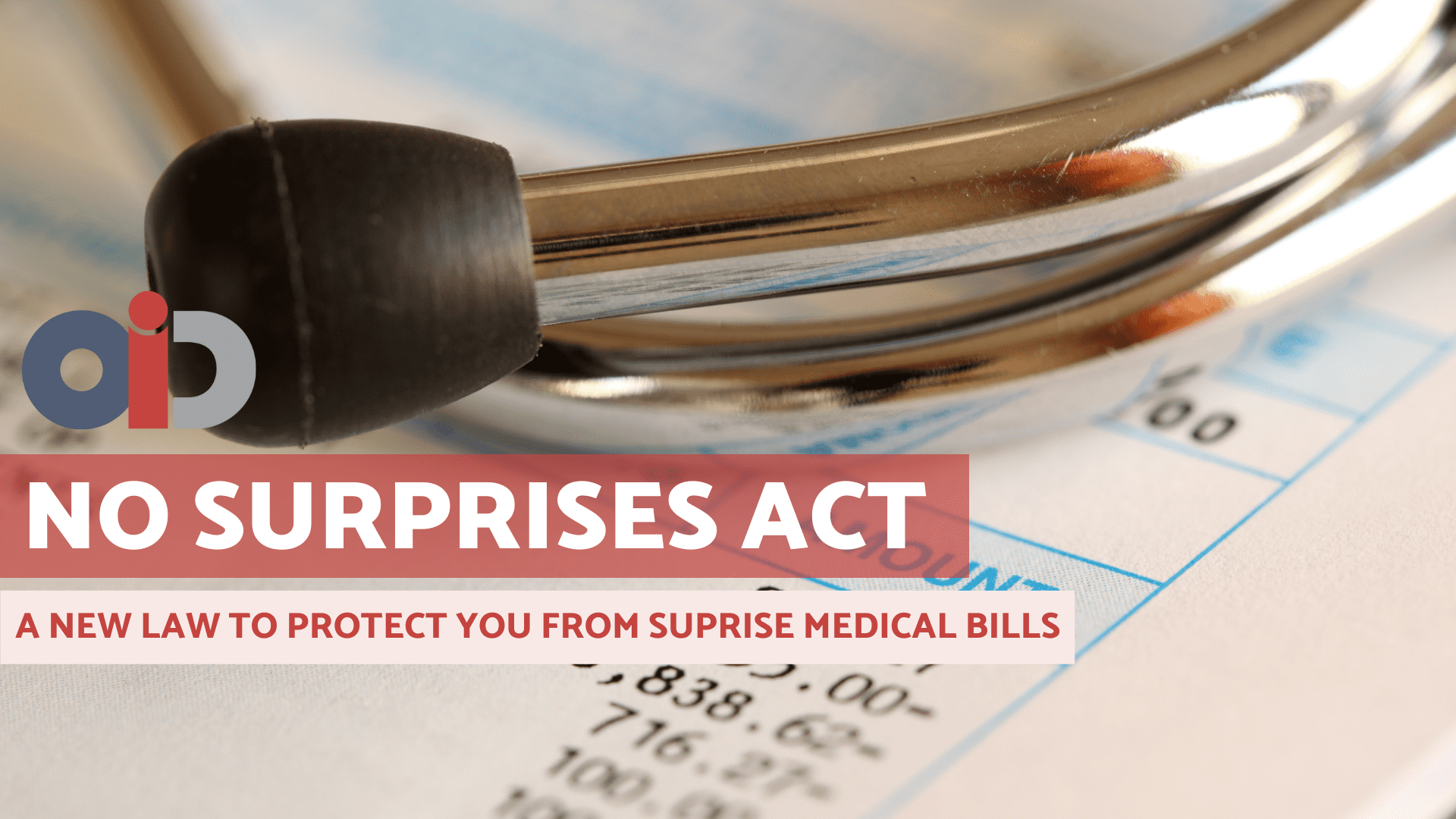
Ending Surprise Medical Bills
“Starting January 1, 2022, consumers will have new billing protections when getting emergency care, non-emergency care from out-of-network providers at in-network facilities, and air ambulance services from out-of-network providers. Through new rules aimed to protect consumers, excessive out-of-pocket costs will be restricted, and emergency services must continue to be covered without any prior authorization, and regardless of whether or not a provider or facility is in-network.”
Resource: CMS.gov
FAQs
Balance billing occurs when a health care provider bills a patient after the patient’s health insurance company has paid its portion. The balance bill is for the difference between the amount the provider charges and the amount paid by the consumer’s health plan, after the patient pays any co-pay, co-insurance, or deductible.
Balance billing can occur when a consumer receives health care services from an out-of-network provider or at an out-of-network facility.
In-network providers agree with an insurance company to accept the insurance payment in full. In-network providers agree not to balance bill.
Out-of-network providers do not have this agreement with the insurance company. Therefore, in the past they sometimes billed the patient for the amount not covered by insurance.
Some health plans, such as Preferred Provider Organization (PPO) or Point of Service (POS) plans, offer some coverage for out-of-network care, but the provider can still balance bill the patient. Other plans offer no coverage for out-of-network providers and leave the financial responsibility entirely on the consumer.
Balance billing is prohibited in both Medicare and Medicaid, as well as Tricare, VA and Indian Health Services.
Surprise billing occurs when a patient receives a balance bill after unknowingly receiving care from an out-of-network provider or an out-of-network facility, such as a hospital. This can occur in emergency and non-emergency situations.
At this time, Oklahoma has not enacted protections for consumers against surprise billing. Beginning January 1, 2022, Federal law provides new consumer protections discussed below.
A new federal law, the No Surprises Act, protects you from:
- emergency out-of-network medical bills including air ambulances, and
- non-emergency services at an in-network facility.
It applies to self-insured health plans offered by employers as well as health insurance companies that offer fully insured individual and group plans.
- A facility (such as a hospital or freestanding emergency room (ER)) or a provider (such as a doctor) may not bill you more than your in-network cost sharing amount for emergency services, without requiring prior authorization.
This is true even if the emergency services you received were at an out-of-network facility or performed by an out-of-network provider.
- Under your health plan, you are still responsible for cost sharing amounts that may include copays, coinsurance, and deductibles.
- You are also protected when you receive non-emergency services from out-of-network providers at in-network facilities. An out-of-network provider may not bill you more than your in-network co-pay, co-insurance, or deductible for services performed at an in-network facility.
- You can still consent in advance to receive care from an out-of-network provider in some situations and agree to pay the provider amounts above your in-network co-pay, co-insurance, or deductible.
- You must receive notice of your rights prior to treatment under the new law from your health plan and from the facilities and providers that serve you.
- If you think the protections have not been applied correctly, you can file an appeal with your insurance company or request external review of the company’s decision.
- You can also file a complaint with the Federal Department of Health and Human Services.
- An independent dispute resolution (IDR) process is available for providers and insurance companies to settle disputes about your bill without putting you in the middle. IDR is also available for individuals who are uninsured, in certain circumstances.
- Other protections in the new law require insurance companies to keep their provider directories updated and to limit your co-pays, co-insurance, or deductible to in-network amounts if you rely on inaccurate information in a provider directory.
- NSA exempts Short Term Limited Duration Insurance from compliance as well as excepted benefits, health reimbursement arrangements or other account-based plans and retiree only plans.
The No Surprises Act applies not only to fully insured individual and group health insurance plans offered by health insurers, but also to all group health plans offered by employers. This includes Fully-Insured and Self-Funded Grandfathered plans, Grandmothered Plans (or Transitional), Student health insurance plans, non-federal governmental plans (state, county, city plans) and church plans (MEWA/Association).
Health plans will be held accountable in meeting compliance requirements under the No Surprises Act that includes member notice requirements, Advanced Explanation of Benefits, up-to-date provider directories and continuity of care provisions.
Providers are required to provide a written explanation of the No Surprises Act and its requirements to both the public and to the patient. This includes certain written notices and consent forms that provide a good faith estimate of the cost of services in advance of treatment.
Health plans and providers are required to resolve payment disputes and to protect the insured and patient from a balance or surprise bill through an independent dispute resolution process if required.
For Oklahoma consumers, enforcement of the No Surprises Act will be carried out by CMS.
Additional Resources
Surprise billing and protecting consumers
Ending Surprise Medical Bills | CMS
What are the new protections?
What are the new protections? | CMS
Overview of rules & fact sheets
Overview of rules & fact sheets | CMS
CMS Center for Consumer Information and Insurance Oversight
CCIIO OKLAHOMA
